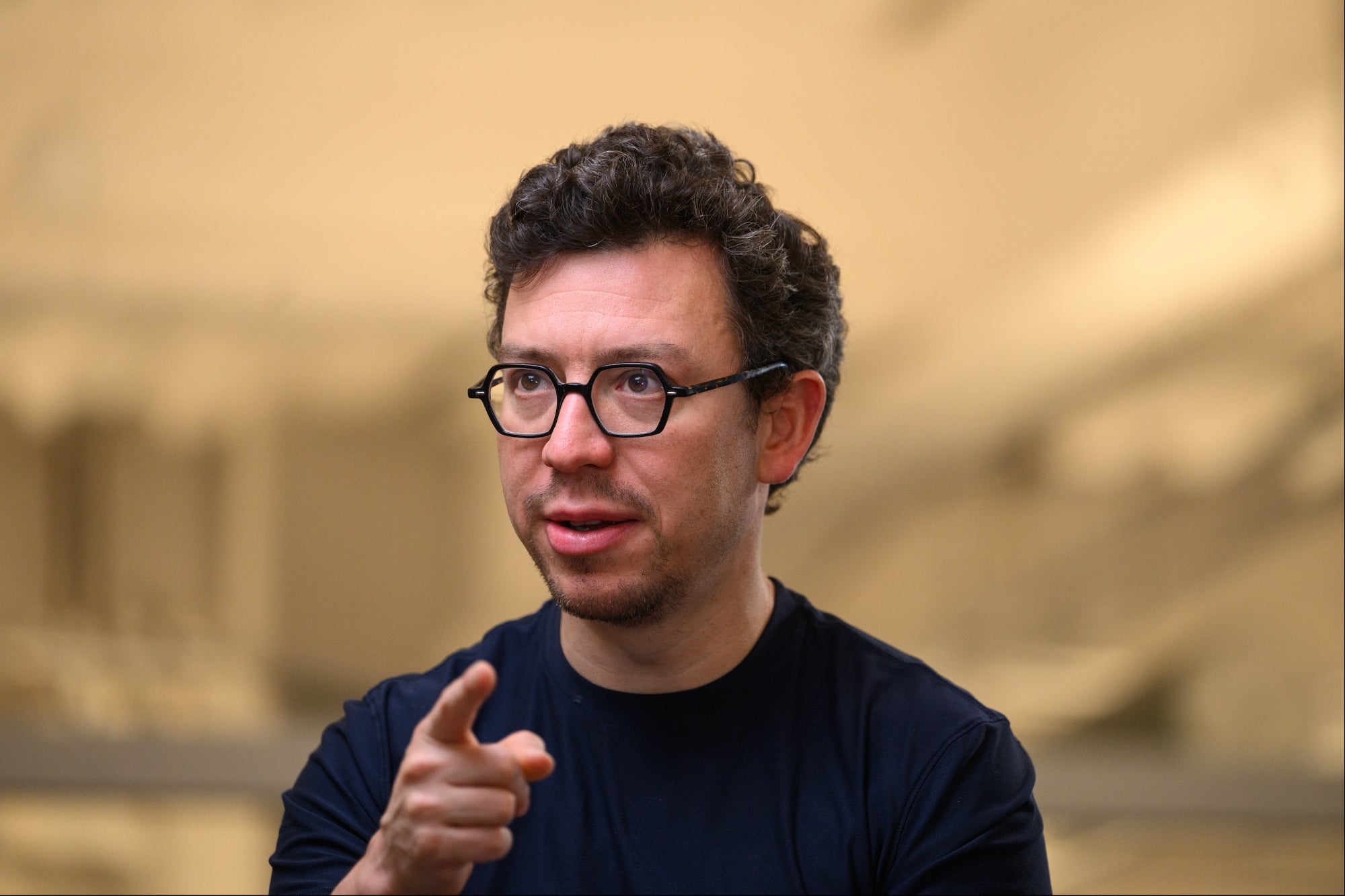You’re reading Entrepreneur Middle East, an international franchise of Entrepreneur Media.
“I must say I work a lot,” says Loulou Khazen Baz, in 2023, more than a decade since she was one of the busiest entrepreneurs on the block after launching Nabbesh, the Arab world’s first online employment marketplace, and thereby proving that, well, some things don’t change with time. Indeed, since selling Nabbesh to UAE-based digital editorial marketplace Ureed in 2020, Khazen Baz today has built a portfolio of overlapping ongoing ventures that serve a singular goal- to enable entrepreneurs from the MENA region, and especially those in the early stages of their ventures. “I help by sharing my own experiences through my startup advisory,” Khazen Baz explains. “I help by bringing in knowledge from great guests and experts on the Conversations with Loulou podcast, and I also enable them by investing via the angel syndicate called Spade Ventures.”
Before we delve into more details about each of these three projects, I ask: if the Baz who founded Nabbesh in 2012 were her mentee today, what advice would she give her younger self? Khazen Baz replies that her younger self faced the same three challenges that most founders usually struggle with in the early days- access to talent, access to funding, and market readiness. “My advice would have been to be ruthless about hiring and retaining the best people,” Khazen Baz explains. “To trust my gut, be weary of red flags, and act on them immediately. A small unresolved situation, a difficult discussion that needs to happen, a hard decision that needs to be taken can become existential if left unresolved. Sometimes, time has a way to solve problems, but more often, problems need to be dealt with on the spot. When the right team is in place, everything else becomes easy to deal with.”
Talking about Nabbesh provides a neat transition into exchanging opinions about Dubai as a startup hub, and Khazen Baz considers entrepreneurs today to be “so lucky vis-à-vis when I was building [in 2012].” She says, “The ecosystem today is more mature, you have better access to talent, and you have more funding pouring into the ecosystem. The investment community has certainly grown considerably. We went from investors dictating terms, to entrepreneurs dictating terms, and it’s an interesting cycle. The great entrepreneurs, I believe, still have leverage.”
Related: Why My Startup Has Taken A Turn At Social Entrepreneurship
This statement also offers an inkling to the insights that Khazen Baz shares through her advisory services for startups in the MENA—after all, who better to tell you what’s a good route to take in the entrepreneurial space than someone who’s gone through the whole roller-coaster ride by themselves! Khazen Baz describes exiting Nabbesh as “the end of a sprint,” and since she considers life to be a series of sprints, she always suggests “focusing on the next one,” and that’s what she did too.
One of her current ventures is the angel syndicate Spade Ventures, a network of likeminded people “who are smart, accomplished, curious, and are looking to create value” by seeding the next generation of startups, with its website stating that the minimum ticket size per person is US$20,000. “As an entrepreneur, I was always excited about meeting other entrepreneurs who were building exciting things,” Khazen Baz explains. “Our ecosystem is so nascent, and there is so much to learn. So, I started investing in 2019 in founders that I liked, who were building something interesting, and who I felt had the resilience to see things through.” The website of Spade Ventures currently lists its portfolio of 10 early stage technology startups that operate in the Middle East, North Africa, and Pakistan, and Khazen Baz explains that she finds meeting “brilliant people who are brimming with energy and optimism” as one of most enjoyable parts of investing in early-stage startups. “It is a great opportunity to build friendships, to exchange notes, and to spend quality time with people,” she says.
Source: Loulou Khazen Baz
Plus, she adds, angel investing is also an opportunity to learn and gain market insights while “witnessing a truly amazing founder journey firsthand.” She adds, “When you invest, you can truly help the founders with everything from user testing to strategy, to hiring, to fundraising. Sometimes, the founders just need to vent, and I am there to listen and offer a shoulder. The founders at that stage are humble, open to feedback, and are experiencing those highs and lows of a typical founder journey.”
But perhaps Khazen Baz’s most popular project right now is her bi-weekly podcast, Conversations with Loulou, which has presented the stories and insights of 53 entrepreneurs and business leaders since launching two years ago. “It is another way to stay entrenched in the local startup ecosystem, and to continue to add value to the ecosystem by sharing stories, insights, tips from people who made it, and sometimes people who are early in their journey, but who are building businesses that are solving big problems,” she explains.

Khazen Baz with her guests for the Conversations with Loulou podcast.
Source: Loulou Khazen Baz
The podcast has since gone on to be featured on Apple Podcasts for the Middle East region under the banner of “Shows That Made Us Think” for 2022, and it continues to be listed among the top 20 podcasts in Apple’s Business and Entrepreneurship categories across the MENA region. Khazen Baz says here that starting a podcast is an endeavor that requires dedication, commitment, and consistency. “You also need to be very careful about guest selection, curating topics for the discussion, leading the discussion, and managing the flow, as well as editing the conversation to get a good story,” she says. “The last thing I want is to put a piece of fluff out there, and I try very hard to bring guests that can truly add value to the listeners.” The level of interest in entrepreneurship-related topics (which is evident through each of her episodes having “3,000 downloads across audio platforms and about 5,000 views on YouTube”) makes her confident in the potential of her podcast to scale significantly. “I am looking for sponsors to help me invest in distribution and building reach, so that our show can touch the lives of more people, and, hopefully, inspire them to build something.”
As Khazen Baz continues working on “creating more impact, more content, more mentorship, and more investment,” she is one of the few in such a position who admit the inconveniences and limitations of being driven and inspired to make change: i.e. the scarcity of time. “I am currently in the process of automating a lot of what I do, and I try to avoid face-to-face meetings unless I absolutely must, and, in general, I must be very strict with my time to the dismay of others,” Khazen Baz says. “I wish I could grab a coffee, have a call, brainstorm, check someone’s deck and give advice, invest in every founder who reaches out, but I can’t. And I am not saying that because I am special. I think everyone needs to be super strict about their time; it is, after all, the most finite resource.”
‘TREP TALK: Loulou Khazen Baz shares her tips for entrepreneurs
Go all in
“Building a startup is hard- you’ve got to be all in. If you chose to be an entrepreneur, you’ve got to accept that there will be a lot of sacrifice. You cannot have it all, sorry.”
Forge strong ties from the get-go
“Build relationships with key stakeholders and investors from day one. Relationships take years to build, and people tend to support/ invest in people they know and trust.”
Make decisions quickly
“Have these difficult conversations, fire someone who is underperforming, do not succumb to blackmail, do not have a single point of failure. Trust your team, but stay vigilant- everyone has got to earn your trust, as much as you’ve got to earn theirs.”
Related: Global Outlook, Local Roots: Equiti Group Co-Founders Iskandar Najjar And Mohamed Al Ahmad

















